- TOPICS
- Soka University holds Kickoff Symposium for the Ministry of Education, Culture, Sports, Science and Technology’s "Private University Research Branding Project" titled "Establishment of a Recycling-oriented Society in Developing Countries”
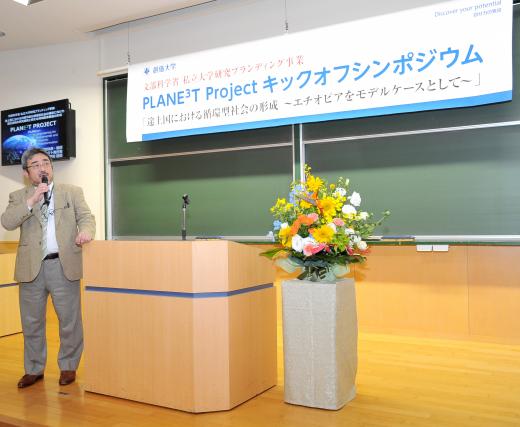
2018/06/05
Soka University holds Kickoff Symposium for the Ministry of Education, Culture, Sports, Science and Technology’s "Private University Research Branding Project" titled "Establishment of a Recycling-oriented Society in Developing Countries”
The PLANE3T Project Kickoff Symposium, “Establishment of a Recycling-oriented Society in African Countries - Interdisciplinary Collaboration between Ethiopia and Japan,” took place on May 12, 2018 (Saturday) at Soka University’s Large Classroom Building 201. This event was based on the adoption of Soka University’s project plan, “Research & Development of Appropriate Technology for Establishing a Recycling-oriented Society in Developing Countries and a Foundation for New Community Industries” (“PLANET3T Project”*), which was adopted by the 2017 “Private University Research Branding Project” sponsored by the Ministry of Education, Culture, Sports, Science and Technology and announced in November 2017.
Approximately 200 faculty and students participated as they welcomed President Firew Tegegne Amogne of Bahir Dar University and President Berhanu Belay of Injibara University of Ethiopia, which is a model region.
Part One of the event began with greetings from Soka University’s President Yoshihisa Baba, which was followed by a report from Dean Tatsuki Toda of the Graduate School of Engineering (and who is the person-in-charge of research projects) regarding the outline of the “PLANE3T Project.” Dean Toda explained “Plankton Eco-engineering,” in which unused biomass is processed at low cost and in which phytoplankton is mass cultivated with nutrients collected from the biomass and sunlight, with applications involving energy conservation. He also shared his goals to improve the health of the people of Ethiopia and to provide environmental and economic education through the production and commercialization of food materials rich with nutrition using plankton as an ingredient, thereby contributing to new industries in Ethiopia with the aim of building a sustainable recycling-oriented society. Dean Toda also shared that, as part of the undertaking, facilities and equipment (including an upright, outdoors plankton culturing device and a state-of-the-art analysis device to measure the useful components of plankton [the MALDI-TOF-MS and UPLC-MS, respectively]) have been procured, and that in March of this year, an Ethiopian inspector team was dispatched and exchanged views with the Ethiopian Ministry of Health, the JICA Ethiopia Office, and local universities, etc.
This was followed by a lecture by President Firew Tegegne Amogne of Bahir Dar University of Ethiopia under the title, “Environmental, Ecological, and Social Issues in Bahir Dar, Ethiopia and Its Surrounding Areas and Efforts Made by Bahir Dar University.” The president shared the issue of the excessive overgrowth of water hyacinths in Lake Tana, which is the biggest body of water (by surface area) in Ethiopia and which serves as an important area for agriculture, power generation (hydraulic, etc.), and tourism. He also introduced how the university, which provides 354 programs, is engaged in resolving various issues while collaborating with outside institutions and universities abroad. The president also shared that they are striving for various new ways to use water hyacinths as a fertilizer and as food for domesticated animals.
In Part Two, under the theme, “JICA’s Cooperation with Africa,” Director General Hiroyuki Kinomoto of the JICA Tokyo International Center introduced efforts centering on the Tokyo International Conference on African Development, sponsored by the Japanese government, to improve the economic development and productivity of private corporations, to promote health, and to increase the number of children that can enter schools.
This was followed by Soka University’s Director Isao Takagi of the Graduate School of Economics, who lectured under the theme, “Social and Educational Significance of BOP Business” and who shared his hopes that, through the “PLANE3T Project,” it will be possible to establish a business model that simultaneously seeks and realizes both economic and social value, and that contributes to the realization of the Sustainable Development Goals (SDGs).
Lastly, Professor Shuhei Ban of the School of Environmental Science at the University of Shiga Prefecuture reported on achievements in the “Establishment of a Recycling-oriented Society in Modern-version Satoumi,” where water plants that excessively grow in Lake Biwa are decomposed through methane fermentation through which energy and nutrients are collected. This project is in the process of actually being implemented, and Professor Ban shared his expectations that the branding project carried out by Soka University be implemented as well.
Before the symposium, the opening ceremony for the “Plankton Eco-engineering Research Center” took place, an academic exchange agreement was signed with Bahir Dar University and Injibara University, and opinions were shared regarding faculty and student exchanges. With this, Soka University now has academic exchange agreements with 198 universities in 58 countries and regions.
* PLANE3T Project: PLANkton Eco-engineering for Environmental and Economic Transformation
Approximately 200 faculty and students participated as they welcomed President Firew Tegegne Amogne of Bahir Dar University and President Berhanu Belay of Injibara University of Ethiopia, which is a model region.
Part One of the event began with greetings from Soka University’s President Yoshihisa Baba, which was followed by a report from Dean Tatsuki Toda of the Graduate School of Engineering (and who is the person-in-charge of research projects) regarding the outline of the “PLANE3T Project.” Dean Toda explained “Plankton Eco-engineering,” in which unused biomass is processed at low cost and in which phytoplankton is mass cultivated with nutrients collected from the biomass and sunlight, with applications involving energy conservation. He also shared his goals to improve the health of the people of Ethiopia and to provide environmental and economic education through the production and commercialization of food materials rich with nutrition using plankton as an ingredient, thereby contributing to new industries in Ethiopia with the aim of building a sustainable recycling-oriented society. Dean Toda also shared that, as part of the undertaking, facilities and equipment (including an upright, outdoors plankton culturing device and a state-of-the-art analysis device to measure the useful components of plankton [the MALDI-TOF-MS and UPLC-MS, respectively]) have been procured, and that in March of this year, an Ethiopian inspector team was dispatched and exchanged views with the Ethiopian Ministry of Health, the JICA Ethiopia Office, and local universities, etc.
This was followed by a lecture by President Firew Tegegne Amogne of Bahir Dar University of Ethiopia under the title, “Environmental, Ecological, and Social Issues in Bahir Dar, Ethiopia and Its Surrounding Areas and Efforts Made by Bahir Dar University.” The president shared the issue of the excessive overgrowth of water hyacinths in Lake Tana, which is the biggest body of water (by surface area) in Ethiopia and which serves as an important area for agriculture, power generation (hydraulic, etc.), and tourism. He also introduced how the university, which provides 354 programs, is engaged in resolving various issues while collaborating with outside institutions and universities abroad. The president also shared that they are striving for various new ways to use water hyacinths as a fertilizer and as food for domesticated animals.
In Part Two, under the theme, “JICA’s Cooperation with Africa,” Director General Hiroyuki Kinomoto of the JICA Tokyo International Center introduced efforts centering on the Tokyo International Conference on African Development, sponsored by the Japanese government, to improve the economic development and productivity of private corporations, to promote health, and to increase the number of children that can enter schools.
This was followed by Soka University’s Director Isao Takagi of the Graduate School of Economics, who lectured under the theme, “Social and Educational Significance of BOP Business” and who shared his hopes that, through the “PLANE3T Project,” it will be possible to establish a business model that simultaneously seeks and realizes both economic and social value, and that contributes to the realization of the Sustainable Development Goals (SDGs).
Lastly, Professor Shuhei Ban of the School of Environmental Science at the University of Shiga Prefecuture reported on achievements in the “Establishment of a Recycling-oriented Society in Modern-version Satoumi,” where water plants that excessively grow in Lake Biwa are decomposed through methane fermentation through which energy and nutrients are collected. This project is in the process of actually being implemented, and Professor Ban shared his expectations that the branding project carried out by Soka University be implemented as well.
Before the symposium, the opening ceremony for the “Plankton Eco-engineering Research Center” took place, an academic exchange agreement was signed with Bahir Dar University and Injibara University, and opinions were shared regarding faculty and student exchanges. With this, Soka University now has academic exchange agreements with 198 universities in 58 countries and regions.
* PLANE3T Project: PLANkton Eco-engineering for Environmental and Economic Transformation
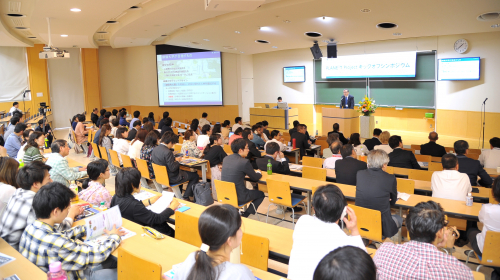
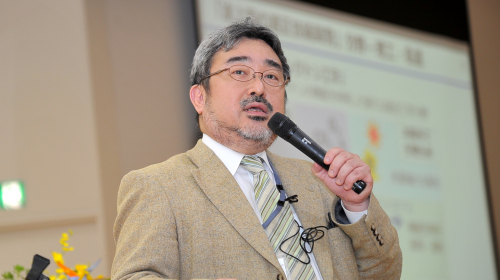
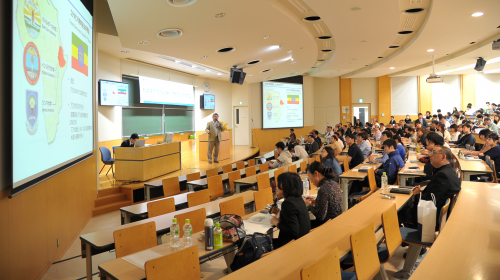
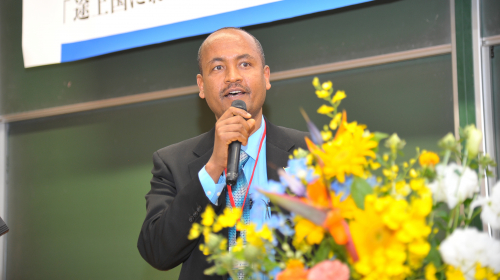
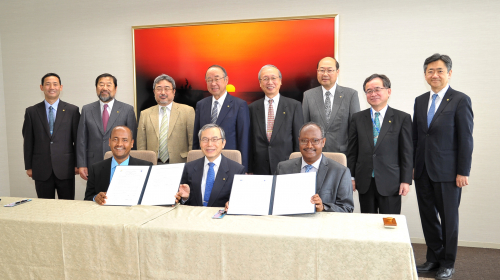
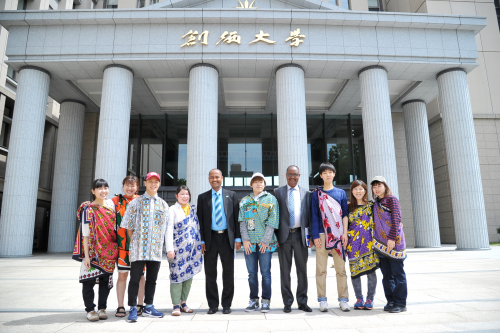
ページ公開日:2018/06/05